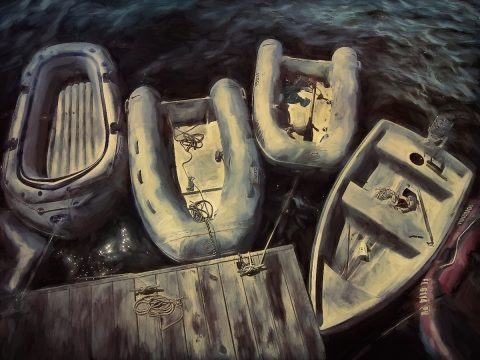This story is a beautifully compact piece, fitting a whole arc of speculative action into a small space. What are the advantages and (are there even any) pitfalls of writing flash as opposed to longer forms of fiction?
The main reason I enjoy writing flash is that it leaves a lot of room for implications. What you leave out is just as important as what you put in. Due to its length it really has no choice but to be somewhat visceral. I suppose that’s the biggest pitfall as well. It’s not like you’re able to spend hours with these characters. They’re always at arm’s length. It’s like seeing a car wreck on the news. You can feel intense empathy and sorrow, but before you know it everyone’s talking about something else.
Your story is a romantic side-glance gone horribly wrong, as if someone whispered, I saw you across a crowded room and knew we could ruin lives together. Do you believe in love at first sight? What do you believe?
I can’t say that I do. How can you look at a stranger and love them in a way that is not simply idealized? There’s too much disconnect. You can’t really love someone without first suffering beside them. The whole idea treats love like a bear trap: You’re either in it or you’re out of it, and you’re only getting into it by stepping in a particular place at a particular time. I’m sure a lot of people think they love or can love a stranger, but it’s likely that those feelings are either just lust or obsession. People in successful relationships also have a tendency to look back and claim they knew it was “love at first sight,” but it doesn’t count if it’s in retrospect. It’s both a romantic idea and an arrogant one, that we think we’re astute enough to detect love with such accuracy.
I’m a big fan of your last lines, the part that begins, “If you see this please get in touch.” Is it true—is bad love better than no love at all? Why is that final appeal so, well, appealing?
Around the time I was working on this story I was reading dozens of Craigslist personals a day. They’re absolutely bizarre and sometimes quite charming. I think it takes a very specific type of loneliness to spur someone to write or read those things, and I think there’s a type of person that might find it romantic in a way. There has to be some sort of rapturous something that spurs a person to anonymously gush over a stranger. Those people in those situations may feel like bad love is better than none at all. Humans tend to fear absence, but a toxic sort of love can poison the notion of love for a person going forward. Personally, I think both can kill, but at least with loneliness you have a clear and constant choice.
There is a definite cinematic quality to the narrative as the characters become a kind of tweaked-out Bonnie and Clyde, albeit in fantasy. Who would play these characters if it were shot as a short film (and damn the budget)?
I’d say Fred Savage (as he appeared in the later seasons of The Wonder Years) and the live-action Wendy in the Wendy’s commercials, but quite a bit younger so that the Kevin Arnold-meets-Wendy crossover is less disjointed. Most of the budget would go to the construction of a time machine.
Going Greek for a moment, it occurred to me that the daydream in this story acts as a kind of Tiresias, presaging the horror that could be/would be (maybe should be?). Where do you stand on the whole fate-versus-free-will debate?
We attribute things to fate that we don’t want to take responsibility for ourselves. The narrator could live out his fantasy a number of times with different people and every time it would feel like fate. And if that weren’t the case, and the narrator experienced it only once, it would still feel like fate if it were wonderful or disastrous enough. Fate is a lovely idea when something favorable happens because it makes us feel like there’s some capitol-M Meaning radiating down from the cosmos. But it’s really quite horrid otherwise, as we blame our situations on it. Anything that robs people of a sense of responsibility is dangerous. We go too easy on ourselves.



 The core workshop of SmokeLong Fitness is all in writing, so you can take part from anywhere at anytime. We are excited about creating a supportive, consistent and structured environment for flash writers to work on their craft in a community. We are thrilled and proud to say that our workshop participants have won, placed, or been listed in every major flash competition. Community works.
The core workshop of SmokeLong Fitness is all in writing, so you can take part from anywhere at anytime. We are excited about creating a supportive, consistent and structured environment for flash writers to work on their craft in a community. We are thrilled and proud to say that our workshop participants have won, placed, or been listed in every major flash competition. Community works.